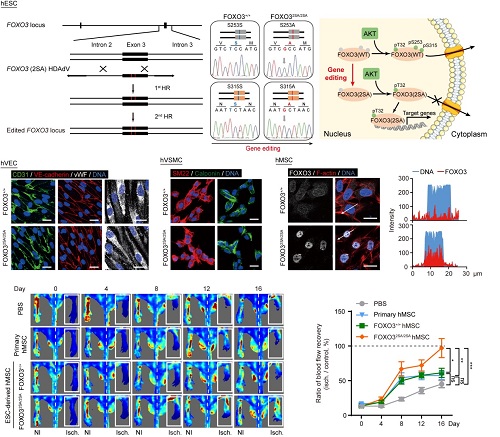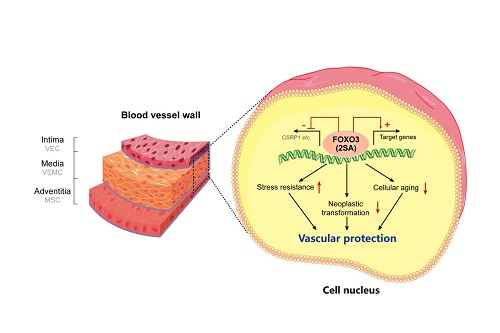Generation of high-quality human vascular cells through genome editing technology by Chinese scientists
Regenerative medicine is the process of replacing, engineering or rejuvenating human cells, tissues or organs to restore normal function in human. One of the key approaches of regenerative medicine involves the use of stem cells. Transplanting cells obtained via in vitro differentiation into the lesion sites promotes the regeneration of damaged tissue and restores the homeostasis and function of tissues and organs. However, the outcome of existing therapeutic approaches is far from optimal. Safety concerns regarding stem cells, such as the risk of gene editing-associated tumorigenesis is a major barrier to the widespread application of this technology.
Recently, scientists from the Institute of Biophysics, Chinese Academy of Sciences, Peking University and the Institute of Zoology, Chinese Academy of Sciences have worked jointly for six years and generated the world's first genetically enhanced human vascular cells by targeting a single longevity gene, FOXO3. Compared to wildtype cells, FOXO3-enhanced vascular cells not only efficiently promote vascular repair and regeneration, but also effectively resist the process of tumorigenic transformation. Thus, FOXO3 activation may provide an approach for generating more effective and safer biomaterials for cell therapies. This study entitled "FOXO3-engineered human ESC-derived vascular cells promote vascular protection and regeneration" is published in Cell Stem Cell today.
FOXO3, an evolutionarily conserved longevity factor, functions as an important regulator to delay cellular senescence, resist various stresses and enhance cardiovascular homeostasis. Activation of FOXO3 counteracts malignant transformation of cells by promoting the expression of tumor suppressor genes and maintaining genome stability. With unremitting efforts, researchers used genome editing to successfully replace two nucleotides in exon 3 of the FOXO3 gene in human cells that inhibited the phosphorylation and subsequent nuclear export and degradation of FOXO3, thus promoting the nuclear translocation of FOXO3 protein and expression of its target genes.

Figure 1. Generation of FOXO3-enhanced human embryonic stem cells followed by differentiation into a range of vascular cell types (hVECs, hVSMCs and hMSCs). FOXO3-activated vascular cells promoted vascular regeneration in a mouse model of ischemic injury.
FOXO3-enhanced vascular cells exhibited improved self-renewal and increased resistance to oxidative injury compared with those of wildtype cells. When tested in a therapeutic context, FOXO3-enhanced vascular cells promoted vascular regeneration in a mouse model of ischemic injury and were resistant to tumorigenic transformation both in vitro and in vivo. Mechanistically, constitutively active FOXO3 conferred cytoprotection by transcriptionally downregulating CSRP1. Taken together, Guang-Hui Liu and his colleagues successfully established high-quality human vascular cells that simultaneously resist cell senescence and tumorigenic transformation via replacing two nucleotides of one gene in the genome.

Figure 2. FOXO3-enhanced vascular cells were resistant to tumorigenic transformation both in vitro and in vivo.
In this study, for the first time human vascular cell function was enhanced via gene editing technology, revealing a new mechanism for the long-lived protein FOXO3 in maintaining human vascular homeostasis. These findings prove the feasibility of using gene editing strategies to obtain high-quality and safe human vascular cell grafts and make it possible to scale up and standardize the generation of high-quality safe human cell therapeutic materials, providing a promising option for future regenerative medicine.

Figure 3. A putative model describing the role of FOXO3 enhancement in the maintenance of vascular cell homeostasis.
Article link: https://www.cell.com/cell-stem-cell/fulltext/S1934-5909(18)30592-7
Contact: Guanghui Liu
Institute of Biophysics, Chinese Academy of Sciences
Beijing 100101,China
Phone: 86-10-64889970
Email: ghliu@ibp.ac.cn
(Reported by Dr. Liu Guanghui’s group)

